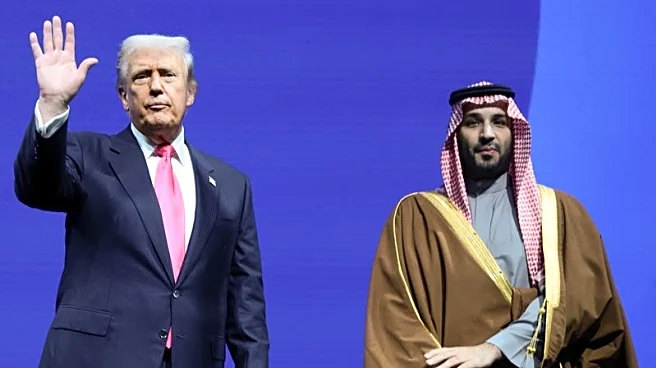By Timothy Gardner
WASHINGTON (Reuters) -U.S. lawmakers cautioned against ushering in a nuclear arms race in the Middle East after the United States and Saudi Arabia said they signed an initial agreement
on civil nuclear energy cooperation.
U.S. Energy Secretary Chris Wright, Interior Secretary Doug Burgum and Saudi Energy Minister Prince Abdulaziz bin Salman signed an initial civil nuclear cooperation agreement on Tuesday as Saudi Crown Prince Mohammed bin Salman, the kingdom's de facto ruler, made his first White House visit in more than seven years.
Talks between the countries on nuclear power cooperation have been going on for years including during the administration of former President Joe Biden. But progress has been difficult because the Saudis have resisted U.S. stipulations that would rule out enriching uranium or reprocessing spent fuel - potential paths to a bomb.
DEMOCRAT CALLS FOR ENHANCED INSPECTIONS
Senator Jeanne Shaheen, the top Democrat on the Senate Foreign Relations Committee, said any deal with Saudi Arabia must include enhanced inspections through an agreement known as the Additional Protocol, which boosts the ability of the International Atomic Energy Agency to verify peaceful use of all nuclear material.
It is critical that the U.S. hold Saudi Arabia to the "gold standard" in what is known as a 123 Agreement to ensure Riyadh will not enrich uranium or reprocess plutonium, as the United Arab Emirates agreed in 2009 when it signed a civil nuclear pact with Washington, she said. "We must not fuel a nuclear arms race in the Middle East."
Concern about proliferation related to nuclear energy rose after the crown prince told CBS in 2018 that "Saudi Arabia does not want to acquire any nuclear bomb, but without a doubt if Iran developed a nuclear bomb, we will follow suit as soon as possible."
Wright told Fox News on Wednesday that uranium enrichment was not in the initial agreement. "It's not about enrichment, it's not about anything related to weapons," Wright said. A day earlier he said the deal has "bilateral safeguard agreements" and a commitment to non-proliferation.
Some lawmakers and non-proliferation experts said the agreement must not expand to allow enrichment and reprocessing. "We can’t hand Saudi Arabia the keys to nuclear tech while ignoring its desire for nuclear weapons," said Senator Ed Markey, a Democrat. "I’m urging the Trump administration to insist on the gold standard safeguards - enrichment bans and full inspections - before any deal."
Andrea Stricker, a non-proliferation expert and deputy director and research fellow at the Foundation for Defense of Democracies, said if the U.S. is lax on safeguards with Saudi Arabia, it will be even more difficult to hammer home with Iran that reconstituting enrichment and reprocessing are off limits.
"Let's hope the 123 extends only to civil nuclear energy and U.S. reactor cooperation," as Wright said on Fox, Stricker said.
(Reporting by Timothy GardnerEditing by Rod Nickel)









